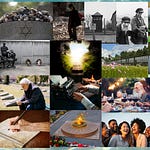Ron: Welcome to Mind Wise, a video podcast and newsletter which presents holistic mental health, healthcare, and wellness perspectives and information. I am your host, Ron Parks, MD, writer, teacher, and consultant. The following is a transcript of a video podcast interview with Promise of Substack's Mental Health Revolution: mentalhealthrevolution.org. An astonishing former Buddhist Monk, a teacher, and according to himself, a meditation nerd, a lifestyle medicine advocate, and a misunderstood comedy genius. He has thoroughly studied ancient wisdom, scientific research, psychology, and personal experiments into simple wellness practices for busy people.
He is also a student of positive self-help psychology, and he talks about the programs he has developed, and some about Acceptance and Commitment Therapy. I want to have him introduce himself, say a bit about his journey, and say where he is now. He developed an outstanding, helpful program that I want him to discuss: the Daily Wellness Empowerment Program, DWEP, and CSM. So, go ahead, Promise.
Promise: Paul. This is my civil name. To make a long story short, when I was a teenager, I went through psychosis and I asked my psychiatrist, how can I take better care of myself? And he didn't know. So, I set out to find the answer for myself. I started by joining a martial arts club. Then, I learned about my teacher's teaching on mindfulness, meditation, ethical living, etc. At age 19, I became a Buddhist monk. That when I received this name, Promise.
I was a Buddhist monk for 16 years, during which I kept researching everything I could on wellness, mental, and physical health. So, I learned a lot, especially from positive psychology, lifestyle medicine, and, of course, the Buddha's and my teacher's teachings. And in my monastic life, I created which you just mentioned. The first is the Daily Wellness Empowerment Program. It is a comprehensive wellness program for mental and physical health. What is so special about this program is that all its practices are to do it yourself, simple, free, backed up by science—a holistically effective wellness practice—meaning that for a wellness practice to enter this program, it needs to meet all of these criteria. Later, during the interview, we'll talk more in depth about the exact content of this program. But that's the first program I put together. And the second one is Central Story Training, or CST. And this is my safe and effective meditation system for the modern mind. So, it's all about meditation, those higher and higher states of well-being, but without the fluff, without the Sanskrit, and just focused on simplicity and efficacy for people today. And of course, its roots are rooted in the original teachings of the Buddha, but the way it's presented is totally new and made for today's world.
Ron: In many parts of the world, there's a lot of interest in mindfulness and meditation, and a lot of it, of course, comes from Vipassana meditation. So, you could probably explain that much better. We're being mindful, aware, meditating, and even a bit of Vipassana. I saw you had a condensed version of Vipassana in one of your articles.
Promise: Yes. Meditation is a therapeutic training of our attention. When the brain is left in its default mode, the network, which as its name indicates, is what happens. We don't pay attention to anything in particular. We're just on autopilot, in our default mode. So we ruminate on the past, project ourselves into the future, worry about what others think about us, and judge ourselves. This might sound familiar to some of your audience. We all have this. It's perfectly normal. According to neuroscientists, these are most likely survival mechanisms. So, we ruminate on the past to learn from my experience. We judge ourselves and worry about what other people think about us because we are a super social species, and we need the group to survive. And then, we try to predict and control the future to improve our chances of survival. And a significant research paper on this default mode network was written by Harvard scientists. It's called a wandering mind, which is an unhappy mind. Publishing a journal, science, and the title says it all. A wandering mind is an unhappy mind. So, when we leave the brain and the nervous system in its default mode network with all this compulsive thinking, past, future judgments, and so on, we tend to suffer a lot because what is trying to help us survive is not necessarily what makes us happy. And the paper concludes, and I quote, the ability to think about what is not happening is a cognitive achievement that comes at an emotional cost. It's a collective achievement. Yes, we are Homo Sapiens.
And we take great pride in our intellect. But when it's out of control, it tends to bully us. It tends to make us suffer more than it helps us. So that's why it's so important to train this capacity of being more present, more with our direct senses, with our mind open and light, as opposed to having our consciousness contracted, trying to control everything compulsively, trying to think about the past, the future. We are much, much, much happier with our minds open and light, allowing things to flow and allowing things to be without too many preferences. Just there, awake and also loving because that's a state in which we seek less for happiness, and therefore, we are happier. That's the funny thing.
Ron: To insert here, I guess. My significant learning is that it's all about balance. Many of these mind functions are relevant and, perhaps, essential in certain things and situations. But, if it's not balanced, I think the Buddha talked about the middle road. An example of being out of balance is everything that gets labeled, you know, has a label of something optimal. You know, medicine has all kinds of labels, and I always try to teach people to get beyond those. However, the goal is to return to balance and finding the best balancing strategies to return to health and harmony. You can work towards or at least start with programs like Promise’ offers, which he is trying to make them accessible to everybody. These are programs you can do yourself or in collaboration with others.
I want to get back to you about when you were describing Vipassana. You said it's about discernment. It involves techniques to make the brain more balanced and to bring in all the areas that make a person productive, rather than being constricted intellectually and thinking.
Promise: We don’t want to throw the baby out with the bathwater. The Buddha never taught non thinking. He taught right thinking. We need to understand that it's not because we think a lot that we are intelligent and productive. We would all gain from learning how to cultivate more of this open presence to regulate our nervous system and cultivate more calm and conscious thinking. So, we think more when we want to feel and think more about what we want to think to help us. That's a skill. So, before making big decisions and having this difficult conversation with our partner or friend, we would all benefit from regulating our nervous system by cultivating more presence. Many people like to do this with breath, where they feel the sensations of the breath naturally coming in and out.
You can also open up to all your bodily sensations. Or you can open up to all sounds and make your mind big and light. You know, open up your peripheral vision. So, you're more in presence and less in survival. When you do this, you regulate your nervous system, and you can produce more beautiful thoughts. You may know that before a musician plays their instruments, they first tune them. These mindfulness tools help us tune our nervous system to produce more harmonious thoughts. There are many scientific studies on how a mindfulness practice helps improve our cognitive function, helping us learn better at school, perform better at work, and so on. So, I say this because many people ask, "Yeah, but in the real world, you have to plan, think, and how will you do that if you're always in the present moment?" That's a great question. But there's a great answer to that: as you practice, the quality of your thoughts increases.
Ron: In terms of the best therapist, person, or person to be in a relationship, it's somebody present, listening, and open. A therapist knows they're in the zone or connected when they hear something from the other like, "Wow, you're the first person who I felt heard me, listened to me." It makes you wonder what kind of place or environment they came from or about their prior life experience. And one of the most important things I always teach is collaboration, which I'm doing with Promise now. Collaboration is essential, as is the ability to be present, relational, and helpful to yourself and others. It's a give-and-take thing. However, in collaboration, allow yourself to get outside of your narrow thinking and brain and take in things beyond yourself, which may be from another person. There's a downside to that, as we're finding out now, that if you carefully choose your collaborators, it's just reinforcing the same stuff, then you are stuck. Maybe you can give us an example of what would be part of the DWEP program CSM. It's all interrelated, but an example of the practices anybody can do would be helpful.
Promise: Wonderful. Thank you. The daily wellness empowerment program has a short morning routine with 10 minutes of sitting meditation. Of course, 10 minutes is just a suggestion; The idea, for all the practices, is to keep it short, but to make it a daily habit. So, you have some sitting meditation, and then you have some Hindu squats and Hindu pushups. During the day, they are all-body workouts. You know, you work your strength, mobility, and cardiovascular fitness with just two exercises. So, it's a great way to wake up the body, get stronger, get ready for the day, and increase your mood. So just these two things: a bit of meditation and a bit of exercise as a morning routine. And then, during the day, you have six general guidelines. Whole foods, plant-based diets before 7 p.m. No intoxicants, meaning no drugs or alcohol, meaningful human connections, nature exposure, and mindfulness are the art of living more in the present moment with this open awareness. Mental nourishment is how we feed our mind. Be careful of what and how we consume the media, and then at night you have 10 minutes of swinging chicken, which is a great exercise to relax the body, have the energy flow throughout our body, and regulate our nervous system before sleep. Then we will be in bed by 10 PM to ensure we get enough sleep at night. So again, short morning routine sitting meditation, Hindu squats and Hindu pushups during the day, general guidelines for food plan-based diet, no intoxicants, meaningful human connections, nature, mindfulness, mental nourishment, and at night, some arm swinging qigong and being in bed by 10 pm.
To have those amazing practices, which are all do-it-yourself, simple, free, backed up by science, and holistically effective, is great, but it's still just half of the program. The other half is how we actually implement it in our busy lives. We do many things that stem from behavioral science, coaching, and so on, that increase our odds of success, and maybe I’ll name a few here. First is, when we learn as a group because it's more fun, if you feel supported, and we encourage each other. Another thing is I encourage every person who takes the DWEP to clarify their Wellness. Why. Why is it important for them to take care of themselves? Maybe it's because they want to suffer less -- they have a chronic condition and want to decrease the symptoms. Maybe they want to be healthier, happier -- what would that look like for them specifically? Maybe they want to have a better presence for their loved ones. Maybe they want to have more energy, more focus for their meaningful projects.
Maybe they want to be more resilient to face personal or societal challenges, or perhaps they want to inspire others to take care of themselves. Those are six typical reasons why people would want to take care of themselves, but it's important that each person knows why he or she wants to take care of themselves. Something that really gives them energy and inspires them to actually interact with those wellness practices.. Another thing we do is that each participant sets their own smart goals. Some of you might have heard about this. SMART is an acronym for specific, measurable, action-oriented, realistic, and time-bound. So many of us set goals that are set up for failure because they're either too big, too abstract, or too unrealistic. And here, I encourage every participant to set small goals they know they can do. It doesn't matter if they're ridiculously low. You know what I say: If you only do one minute of sitting meditation daily, it's great because one minute is always 100 times more than zero minutes. So, if this is the one minute you need to get going, set daily habits, build the momentum, then that's the best goal you can set for yourself. And then, it becomes easier to do a bit more and more.
Ron: Many Western exercise teachers or physical therapists use many of the exercises from the East in their programs for cardiovascular work, strengthening, and balance, including mental balance. Mindfulness practices have become a part of many modern therapies and work. I appreciate Promise's interest in ACT therapy. I studied and integrated some of the ACT work into my practices. I think ACT has some roots in Eastern teachings and the West. But it's one of the most popular therapies today. If you want to mention a little about that, please do.
Promise: Yeah. Act Steven C. Hayes, one of the founders, is keen on having us calling us "act". ACT stands for Acceptance and Commitment Training when practiced on one's own, or taught in a coaching or corporate context. But ACT also stands for acceptance and commitment therapy in a psychotherapeutic context. I won't go into detail about the relationship between Eastern Practices and Act. I'm writing a series of articles on this right now. But basically, what is so interesting about this system is that it's evidence-based. They spent, I think, 15 or 20 years researching the parameters that influence happiness and mental health the most. They identified six, four of which relate to the quality of our presence. So, they summarize it in acceptance, which is like an accepting presence and involves living a life aligned with our values—a meaningful, purposeful life. So, it's a theoretical model that can predict strongly and accurately how well a person can do in life.
They also teach those as skills—six skills to shift these parameters toward more happiness. One is presence—the ability to connect with the present moment to hear what we hear, feel what we feel, and see what we see. Another one is acceptance—this open, nonjudgmental, equanimous attitude toward the present moment.
Another one is cognitive defusion, which is a term they coined. The idea is that, by default, our mind is fused into the content of our thoughts and sensations. We take our thoughts and sensations as something extremely real and perceive present moment as depicted by them. Cognitive defusion means we cognitively step back from thoughts and feelings and see them as parts of the present moment. They come, go, are alive, and are just a tiny part of the experience. This means that the thoughts or sensations can still be there, but our experience of them is very different. An analogy is, let's say we're drowning in the middle of a river. It's all dark, and we are panicking. We push ourselves to the surface, we breathe, and we go back to the shore. Now we're sitting on the dry shore, and we look at the same river. The river is the same, but our experience of it is totally different. In the same way, when we are very fused to our thoughts and feelings, our experience of them but our experience of it is totally different. But we are much safer when our mind is more open and present. So that's cognitive defusion. And the last acceptance skill is seeing ourselves as the observer, meaning we identify less with the content of experience and more with this open space of awareness. And that's highly therapeutic. So, one way to look at it is that those four acceptance skills—presence, acceptance, cognitive diffusion, and identifying with the observer—can be seen as the four facets of an effective mindfulness practice. So, this is also highly enriching for people who've learned about mindfulness meditation through the traditional lens. It's also extremely helpful for them. So, it's a dialogue; science and tradition can enrich each other.
Ron: Self-help work can be vital to improving, getting better, or achieving your goals. I know that earlier in Promise's life, which he shared with you, he went to somebody, and they were limited in the scope of what they had to help or teach him. So, Promise had to take things in his own hands, so to speak. It is always advised that if you are searching for a teacher, you should be careful and discerning when picking the right one.
Anyway, we'll have to wrap up, but we could say that with his abilities and talents, Promise could be a famous university professor.. But then, if he went in that direction, he would again be in a very constricted environment. So, I'm hoping we'll continue to see more of Promise's valuable and excellent work.
Promise: I'm a high school dropout, by the way.
Ron: Well, that is part of your fantastic journey. Also, I want to say at the end that, you know, I've looked at your teachings, and I actually have added a few more practices to my program. I hope to collaborate more with Promise in the future, so maybe he'll take some things I've developed in my work. And I have to brag that my program has been well proven because I'm 81 years old now and still doing everything I love. And so, any last words? Tell them about your Substack and some programs you're doing or offering now.
Promise: Thank you. Yes. I want to go back quickly on what you just said about self-help, which I call empowerment. That's what I promote: a self-care centered approach to mental health. And I see that's what you've been doing. You've been taking good care of yourself. And you empower your patients to take good care of themselves. That's really what I want to promote. If any psychiatrist or therapist is watching this, I encourage them to learn about all those practices. There are things that are science based, simple, free that you can do every day that really do make a difference in your mental health and also in the quality of your presence, because as Dr. Parks just said, the quality of our presence and our listening is already very therapeutic. But first, we have to take care of ourselves. We cannot give what we don't have. If we don't have inner space, if you don't have presence, if you don't have love, it's going to be hard to give this to patients.
I really hope all mental health professionals listening to this can adopt a self-care-centered approach to mental health. This means that as they use all the beautiful tools they have to help the patients, their clients, they also want to make it their number one priority that each of their patients is empowered with the knowledge of self-care.
So yeah, thank you, Dr. Parks. If anyone is interested in my work, they can go to mentalhealthrevolution.org. There's a guide to the Daily Wellness Empowerment Program and the Central Story Training. Those are great places to start.
Ron: Thank you, and I thank all our listeners for being open and taking some action on your own. Try to find an excellent teacher who can positively influence and collaborate with you to meet your life goals and have a happy journey. Thank you.
Promise: All of my content is free. We're developing an app so people can learn everything on their own for free. But for those who do feel the need to be accompanied, I also offer individual and group coaching, both online and in person.
Ron: Very good. Thank everybody and thank you, Promise.
Promise: Thank you. Have a good one.
Ron: I appreciate your interest. I want you to know that your ideas and comments are welcome. Please share with others. A special thanks to Shan Parks, editor and project manager for Parks Press for his valuable collaboration and editing. Subscribe to my Substack newsletter and podcast at www.inmindwise.com. All content is created and published for educational purposes only. It should not be considered a substitute for professional or medical services or guidance. Always secure healthcare providers' care regarding medical or mental health conditions. This communication does not provide medical diagnosis, recommendations, treatment, or endorsements. Thank you.










